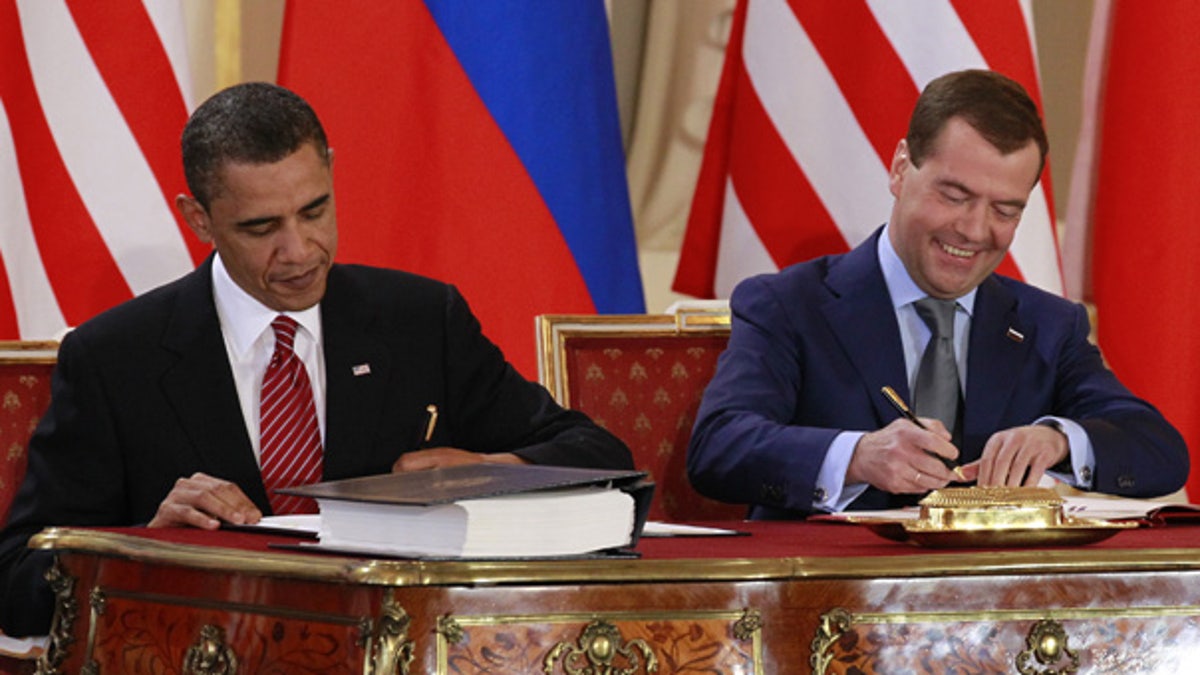
FILE: In this April 8, 2010, photo, President Obama signs the New START treaty with Russian President Dmitry Medvedev at the Prague Castle. (AP)
The weapons reduction treaty struck between Russia and the United States ran into headwinds on Capitol Hill Sunday, as two top senators warned that concerns over the Obama administration's newly unveiled nuclear strategy could trip up the treaty's ratification.
President Obama and Russian President Dmitry Medvedev signed the document Thursday, committing their countries to reducing their nuclear arsenals by historic amounts. Under the treaty, nuclear warheads would be reduced by one-third and the missiles and other vehicles carrying them would be cut by half.
But the treaty's signing coincided with the release of the administration's new nuclear weapons policy, which rules out the use of nuclear weapons against most non-nuclear countries and states the United States does not intend to build or test new nuclear weapons. Sen. Joe Lieberman, I-Conn., expressed concern about that policy Sunday and said it may have to change in order for the Russia treaty to clear the Senate with the needed 67 votes.
"We have to make darned sure our nuclear warheads are capable, are modern," Lieberman told "Fox News Sunday," as world leaders arrived in Washington for the start of a major nuclear summit. "I'm going to be real hesitant to vote for this treaty unless we have a commitment from the administration that they're prepared to modernize our nuclear stockpile."
Lieberman said the administration will have a hard time getting the votes to ratify in the Senate unless it commits to modernizing the stockpile and obtains clarification from the Russians about whether they'd consider pulling out of the treaty if the United States pursues its missile defense shield.
"I don't believe there will be 67 votes to ratify the START treaty" unless those conditions are met, Lieberman said.
Sen. Lamar Alexander, R-Tenn., the third-ranking Republican in the Senate, also said the administration's nuclear policy is "troublesome."
"It takes away our ambiguity about our use of nuclear power," he told "Fox News Sunday," adding there's "not a chance" the Russia treaty will be approved this year.
"This is a treaty for next year," he said, explaining that the economy, terrorism and the national debt will take priority this year.
Meanwhile, Secretary of State Hillary Clinton and Defense Secretary Robert Gates defended the agreement in interviews Sunday morning, saying nuclear nations need to be mindful of the threat that nuclear material could fall into terrorist hands.
"It's a serious threat," Clinton said on NBC's "Meet the Press." "We know that terrorist groups, primarily Al Qaeda, persist in their efforts to obtain enough nuclear material to try to do something that would cause just such mass havoc and terror and damage and destruction that it would be devastating."
She said the United States will still be able to protect itself and its allies despite efforts to reduce stockpiles.
"We have, still, a very powerful nuclear arsenal," Gates said.












































